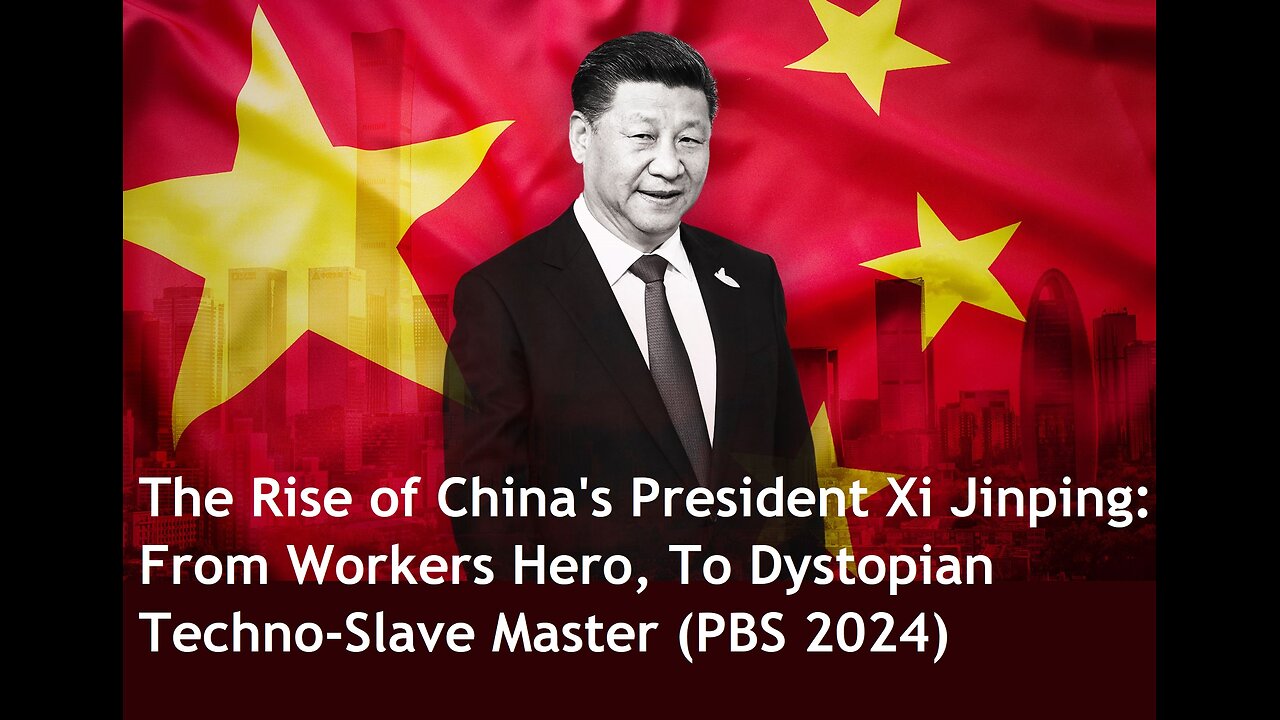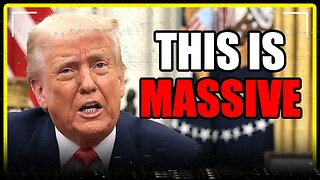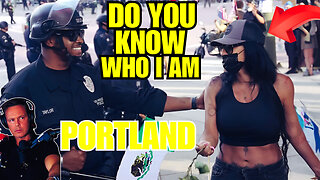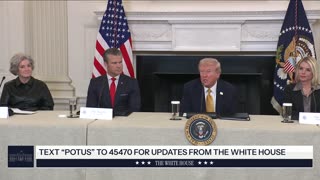Premium Only Content

The Rise of China's President Xi Jinping: From Workers Hero, To Dystopian Techno-Slave Master (2024)
Extract under Fair Use from PBS Frontline documentary China, the U.S. & the Rise of Xi Jinping (November 2024) https://www.pbs.org/wgbh/frontline/documentary/china-the-u-s-the-rise-of-xi-jinping/
We Have Been Harmonised: Life in China’s Surveillance State
https://www.amazon.co.uk/have-been-harmonised-Kai-Strittmatter/dp/1913083004
Document Number Nine
https://www.lrb.co.uk/the-paper/v41/n19/john-lanchester/document-number-nine
The most important of these diametric opposites concerns Western liberal values. In 2013, an amazing paper from the highest reaches of the CCP, catchily known as ‘Document Number Nine’, or ‘Communiqué on the Current State of the Ideological Sphere’, came to light. (The journalist who leaked it, Gao Yu, was sentenced to seven years in prison and is currently under house arrest.) Document Number Nine warned of ‘the following false ideological trends, positions and activities’: ‘promoting Western constitutional democracy’; ‘promoting “universal values”’; ‘promoting civil society’; ‘promoting neoliberalism’; ‘promoting the West’s idea of journalism, challenging China’s principle that the media and publishing system should be subject to party discipline’; ‘promoting historical nihilism’ (which means contradicting the party’s view of history); ‘questioning Reform and Opening and the socialist nature of socialism with Chinese characteristics’. The paper, which is cogent and clear, takes direct aim at the core values of Western democracy, and explicitly identifies them as the enemies of the party.1 It sees the internet as a crucial forum for defeating these enemies. The conclusion speaks of the need to ‘conscientiously strengthen management of the ideological battlefield’, and especially to ‘strengthen guidance of public opinion on the internet’ and ‘purify the environment of public opinion on the internet’.
Document Number Nine is thought to have been either directly written by, or under the auspices of, President Xi Jinping. It marked a new turn in the history of China, and quite possibly the history of the world: the moment at which a powerful nation-state looked at the entire internet’s direction of travel – towards openness, interconnection, globalisation, the free flow of information – and decided to reverse it. In effect, it was a decision to prove the Western boosters of the internet – holders of Friedman’s nutcracker view – wrong.
Between them, Griffiths and Strittmatter tell the story of how China arrived at this point, and what happened next. China took to the internet relatively late and relatively slowly: in 1994 there were only about 1500 internet users in China, most of them academics, with, according to Griffiths, ‘the entire country sharing the equivalent of what was a home connection in the US’. Today, the number of internet users in China is 830 million and counting, with most of them accessing it via smartphones. The party has fought many battles against internet freedom over the course of that quarter-century.
The first fights were mainly to do with news, in the form of newsletters such as Da Cankao (‘big reference’) or news sites such as China Digital Times. Overseas websites such as the New York Times and BBC were blocked, and Google was allowed into China on the condition that it censor itself, until the resulting inner torment caused the company to withdraw in 2010. Facebook has never been allowed into China, despite Mark Zuckerberg’s increasingly tragic attempts to suck up to the CCP: by prominently announcing that he was learning Mandarin, being photographed jogging in Beijing’s reeking, toxic smog, asking Xi Jinping to name his daughter (Xi declined) and – my favourite – making sure he has a copy of Xi’s arse-numbingly tedious The Governance of China on his desk when Chinese journalists visit Facebook. (‘I’ve bought copies of this book for my colleagues as well,’ Zuck says. ‘I want them to understand socialism with Chinese characteristics.’)
The biggest internet companies in China can be seen as knock-offs of American originals, though because China is so big, the Chinese versions are now in many cases larger than their US templates, and as they have grown they have added many distinctive features of their own. Baidu is Google, Alibaba is Amazon (they’re the ones behind ‘Singles’ Day’), Tencent is sort of Facebook plus Netflix. These three giants together are known as BAT, analogous to Silicon Valley’s FAANG of Facebook, Amazon, Apple, Netflix and Google. Sina Weibo, usually referred to just as Weibo, is Twitter, which has been blocked in China since 2009. The story of the Chinese internet pivots around Weibo, because it was that company that came closest to embodying the opening up of information that internet advocates see as the main transformational point of the technology....
-
 15:38
15:38
Cash Jordan
2 hours agoPortland Zombies EMPTY 52 Stores… Mayor FREAKS as “Sanctuary” SELF DESTRUCTS
161 -
 1:06:06
1:06:06
vivafrei
2 hours agoAnother Illegal Alien Kills Americans! Candace Owens Promises to Violate Kirk Gag Order? & MORE!
91.6K20 -
 1:42:30
1:42:30
The Quartering
3 hours agoTrump Blamed For NBA Rigging Scandal, Major X Change Renders Site Useless, Church Nonsense
115K31 -
 4:18:11
4:18:11
MattMorseTV
5 hours ago $49.36 earned🔴Trump makes URGENT ANNOUNCEMENT.🔴
60.2K55 -
 12:05
12:05
Clintonjaws
8 hours ago $7.87 earnedPortland ICE Rioters Getting Arrested - This Is Priceless!
35.9K19 -
 LIVE
LIVE
Side Scrollers Podcast
5 hours ago🔴FIRST EVER RUMBLE SUB-A-THON🔴DAY 4🔴WAKE YOUR ASS UP!
964 watching -
 LIVE
LIVE
World2Briggs
1 hour agoWhere should you live? Ask me Live
23 watching -
 LIVE
LIVE
LFA TV
18 hours agoLIVE & BREAKING NEWS! | THURSDAY 10/23/25
1,215 watching -
 1:32:57
1:32:57
The White House
3 hours agoPresident Trump Makes an Announcement, Oct. 23, 2025
15.5K18 -
 1:04:21
1:04:21
DeVory Darkins
5 hours agoDemocrats PANIC by launching ICE doxxing portal as Newsom suffers MAJOR LEGAL BLOW
141K65